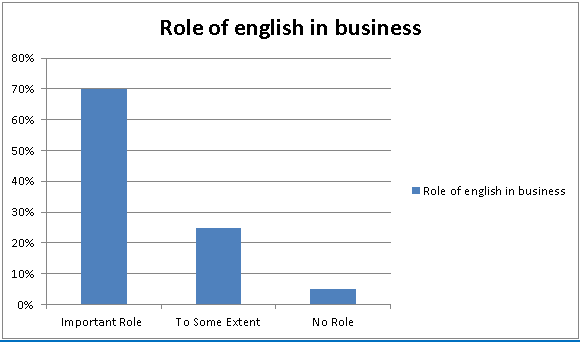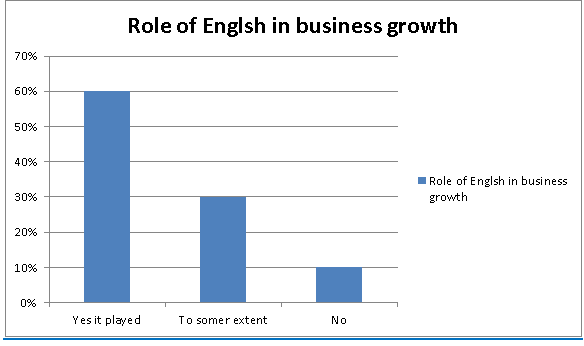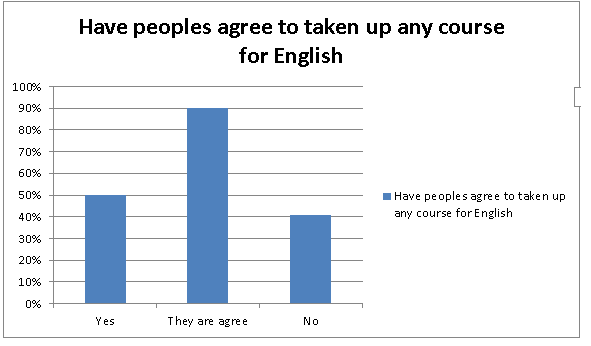Kamran Hider, Ridda Farooq, Maira Fatima, Sobia Ambreen, Ehtisham Muhammad Usman
Instructor: Naima Batool
Department of English( UMW)
Abstract
Business English is one of the examples of the English for a Specific Purpose, In the case of Business English, it is largely used in international trade by many whose primary spoken or written language in English. In a globally connected world, Business English is becoming increasingly important as more and more companies need their staff to be multi-lingual language. The goal of any Business English Course is to allow its users to effectively communicate with others in a business environment, whether that communication is in correspondence, face to face meetings, or other methods. Therefore, a Business English Language may include topics such as business English reading, letters, and resumes, business phrases, or terms of sale, advertising, and marketing. Related to the definition of Business English or English for Business Purposes, it shares the important elements of needs analysis, syllabus design, course design, and the selection and development of materials with all ESP fields of work. Teaching Business English (English for Business) requires a teacher’s awareness of the subject matter. ESP combines the subject matter and English language teaching skills. The role of a teacher at this stage is managing to adapt teaching skills and strategies for teaching Business English
Key Words: Business English, Global Status, Impact on Business
Introduction
Business English is a type of English that has a specific purpose. It is the brand of English that is used in an official or business setting. It has the aim of efficient and clear communication with your boss, co-workers or other professionals. It is the language of the international workplace. This means that once you master it, you can use it to communicate with any other professional in any part of the world. It connects you to everyone else. For example, you may be based in the U.S and your client may be from China, but the shared knowledge of business English allows you to communication and negotiate a deal .However, it is important to be aware that knowing business English is only one part of doing business internationally. Whenever you are dealing with foreign clients, it is always advisable to educate yourself on their culture, so that you do not (even unintentionally) say something that is offensive. To start learning business English for international communication (or even just within one country), check out Coursers . They offer online courses for all different kinds of business English subjects, including business English for cross-cultural communication. Another resource that makes it easy to perfect your English for business purposes is Fluent. Fluent takes real-world videos—like news, educational videos and inspiring talks—and turns them into personalized language lessons. Currently, we have over 500 videos in the “Business” category of our English video library, and new videos are being added all the time.
Business English is actually a broad term used to cover a variety of language used in workplace communication. For instance, the business English that you use during a presentation will be very different from the small talk you engage in at a networking event. “Presentation English” is pretty formal and controlled, whereas “networking English” involves an element of fun but still follows the rules of politeness. This means you have to do your research to prepare for formal situations, like presentations, that require business English. You have to be ready to use the right words and get your point across, without stumbling or forgetting. In networking situations, however, your main aim is to create a pleasant and memorable impression. For this, you may want to think more about your body language and have an elevator pitch ready. Both of these types of business English are “formal,” but the level of formality differs.
The language of business English is marked by the fact that everyone in business is busy. Therefore, if you choose to speak to someone, you should make their time worth it. As a result, there is no space for rants or long rambles. You have to be quick, specific and very concise (complete and clear, but brief). If something can be expressed in 10 words, don’t express it in 20. See if you can express it in 7-8. To make your communication successful, you have to know exactly what you want to say, and say it in the best possible way. There are certain words and phrases specific to business English. If we used some of these words and phrases in a random everyday conversation, they might make us look weird, but they present us as articulate (able to express ourselves well) and efficient in a business English situation. For example, in the field of project management, you may get better results using the word “authorization” in place of “permission,” “deliverable” instead of “completed product,” “consensus” in place of “majority opinion” and so on. Yes, there will be similarities, and you may find yourself slipping into colloquial (everyday) English occasionally, but you have to control it in a business setting. Slang, expletives (swear words) and colloquial lingo aren’t really permitted in an “official” setting.
For instance, we may greet a close friend with a “Hey! Wassup?” But with a co-worker, we are often better off saying, “Hello. How are you?” Even different regions matter when it comes to business English, so you may have to adjust your accent and vocabulary according to your situation. American business English differs from British business English, for example. So if you have recently relocated to the U.S, you will need to be prepared. You will have to focus on both learning American idioms as well as mastering American pronunciation.
With business English, your job is to get your point across. If you happen to meet an industry professional, you need to come up with the best Elevator Pitch to convince them your ideas are worth their time. In a job interview, your goal is to give the impression that you deserve to get hired. During office arguments and disagreements, you can benefit from remaining diplomatic and mature. Business English is about maintaining a professional front. It is about remaining polite and courteous always. You need to avoid coming across as blunt and tactless. If you are giving feedback to a colleague, for example, you can’t just blurt out whatever comes into your head. One trick is to follow the “Sandwich Rule,” particularly if the feedback is negative. Start off by saying something positive, then point out the “negative” aspect and how it can be improved, and finish off with another positive point. Writing a winning cover letter is an art in itself. Writing emails, memorandums, papers or even finalizing a resume all require a different skill-set.
For business writing, you need to learn to critically read and analyze the writing of others, and also learn how to express yourself in writing. Try studying sample cover letters and articles: Memorize the format, pay attention to how paragraphs are structured and which words are used often in the text. When you are writing for practice, imitate that style. Speaking confidently during a conference call or a group meeting requires different skills. To speak well, you need to develop confidence. Try practicing in front of a mirror, or get a study partner to practice your English speaking on. As a student of business English, you must learn and master both written and spoken language. You must be able to speak fluently and write efficiently with equal ease.
Yes, you have to learn the language, but you also need to know when and how to apply it. Using business English well doesn’t mean showing off your knowledge or your fancy vocabulary. People are going to be impressed by how smoothly you complete a task, not how much you know. You have to remain solution-focused and think on your feet (in the moment, as things are happening). You may not always know all the right words, but if you can get your message across clearly and briefly, you are likely to be successful. There are still different levels of communication required for different situations. For example, during a presentation, you still have to focus on your research and vocabulary to appear knowledgeable. But when you are answering questions from a co-worker or your boss, your main aim is communication. In fact, whenever you are directly asked for an opinion or a solution, it is a good idea to focus on communication the most.
You won’t master business English in a day. You are bound to make mistakes and embarrass yourself. But it is important to keep trying, to learn from your mistakes and keep practicing. Never lose hope or even think about giving up. No one is born “fluent” in any language. If you are sincere and dedicated enough, you will succeed in learning whatever you set your mind to. Business English is a life skill that will help you in countless ways, and the only way to master it is to keep at it until you do. The only real secret to success with business English? Practice it every day. Set aside a chunk of time for learning, and make sure you show up and do your lessons. So in order to ace business English, you need to first have decent speaking and writing skills. You need to focus on your pronunciation, diction and accent. You also need to regularly practice and develop your vocabulary. At the same time, you have to focus on your personality. Be more confident, empathetic (considerate of others’ thoughts and feelings) and proactive. Don’t forget to work on your body language, too! And finally, always remember that clarity and brevity are highly appreciated. So even if you are learning business English on your own, make sure you go out and communicate, interact and learn as much as you can. Believe in yourself, remain focused and you are sure to succeed by leaps and bounds.
Literature Review
Business English can be variably defined depending on the scope the researcher is examining. The term is broad and it represents every linguistic aspect used in business activities, in oral or in written form; these are vocabulary used in business, trade, finance an international relations, typical business communication skills such as presentation, negotiations, meetings, correspondence or report writing. Due to its specific character it is considered to be “a part of English for Specific Purposes and can be considered a specialism within English language learning and teaching” (Business English) Many scientists have tried to formulate exhaustive explanation of English for Specific Purposes (ESP). However, it appeared to be quite difficult. According to Swales, ESP is a subdivision of a wider field, Language for Specific Purposes (LSP), which is defined as: “…the area of inquiry and practice in the development of language programs for people who need a language to meet a predictable range of communicative needs.” (Swalws, 1992) Dudley-Evans and John distinguish absolute and variable characteristics of ESP and offer us the definition of ESP as follows:
Absolute Characteristics
- ESP is defined to meet specific needs of the learners.
- ESP makes use of underlying methodology and activities of the discipline it serves
- ESP is centered on the language appropriate to these activities in terms of grammar, lexis, register, study skills, discourse and genre.
Variable Characteristics
- ESP may be related to or designed for specific disciplines
- ESP may use, in specific teaching situations, a different methodology from that of General English
- ESP is likely to be designed for adult learners, either at a tertiary level institution or in a professional work situation. It could, however, be for learners at secondary school level
- ESP is generally designed for intermediate or advanced students.
- Most ESP courses assume some basic knowledge of the language systems.” (Dudley-Evans, John, & Jo, 1998) This definition shows that ESP is not necessarily concerned with a specific discipline, nor does it have to be aimed at a certain age group or ability range. It should be seen simply as an ‘approach’ to teaching, or what Dudley Evans describes as an ‘attitude of mind’.
It is really interesting to note the emergence of ESP in the scientific research. According to Ann Johns’ historical review, ESP presents at least three problems. The first is where to begin, since ESP has a long history. Ann Johns and other experts agreed that 1960s is the crucial period for several reasons. First, John Swales started the movement history in his Episodes in ESP from 1960s. Another reason is the industrialization which demanded the broad usage of the language for the specific purposes and required the communication of the people connected with similar occupation or interests. Moreover, growth of science and technology advanced ESP appearance in historical sources. That generated appearance of ESP courses and different approach towards ESP – it was considered as unique type of language worth further analysis and study. The second problem seems to be a lot of materials published in local or international journals. A lot of international organizations or research publications are actively involved in promotion of research on English for Specific Purposes. Among them should be mentioned the Latin American ESP community and ESP journals in Brazil, Asian ESP journals and the European Association of language for specific purposes and so on. Due to the variety and enormous amount of works it is really hard to define which researcher to use and cite. The third problem that confronts the reviewer is making clear distinctions between research and practice. ESP is assumed to be the practitioners’ movement at its core devoted to establish the needs and relevant discourse features for a targeted group of students. As Johns notes, the majority of works in the journals were devoted to pedagogical issues with only a few dedicated to purely research matters. (Johns, 2013) Business English as part of English for Specific Purposes has emerged in the research papers relatively late as the main focus of ESP were English for Academic Purposes and the English for Science and Technology. That happened due to the development of science and technologies in 1950s or earlier. However, English for Academic Purposes implied two broad branches, such as: English for general purposes and English for Specific Purposes. The latter implied the elements of business English and were united under the umbrella term – English for Business Purposes. The early researches are mainly focused on teaching and discussing of English under the term – Business for Occupational Purposes, which meant that this field is very narrow and concentrates on the occupation and its fulfillment. The language here is used as the mean of communication to order and receive something important. However, the research papers are mainly focus on the written language as at that time a few personal meeting opportunities were possible. The letters were mainly simple with avoidance of ambiguity. Gradually, the perfection of business partnership advances the personal interaction and that emerged more researches dedicated to negotiations and meeting. However, according to Bargiela-Chiappini and Zhang “early linguistic analyses of business negotiation and business meeting remained relatively isolated examples of empirical research in the use of English in Business. It was not until the 1990a that discourse analyses, contrastive ethnography, laid the foundation of a multimethod approach to “business discourse””. (Bargiela_ Chiappini & Zhang, 2013) It is important to clarify the implication of the umbrella term of Business English. Business English defined as the mean to meet specified needs of learners and the communication among businesses implies two subdivisions. They are English for General Business Purposes and English for Specific Business Purposes. Their former Purposes is dedicated to pre-experienced learners, who study business English but have not defined the specific field of their activities yet, English for Specific Business Purposes is mainly devoted to job experienced learners who are qualified in their field and need improvement in language to advance. The interest of the job-experienced learners is considered by the discourse makers and book publishers. They even conduct surveys to investigate the interest and the needs of the learners and to create the books and discourse in accordance of their demands. One of the most interesting surveys was conducted by Global English in 2010. According to them more than 26,000 subscribers from 152 countries were participated in the survey. The subscribers were asked a range of questions, with three of them of particular interest. The first asked about the importance of knowledge of the English language in their current jobs. 74% of respondents answered that English is required. 18% said it is important and only 1% said it is not important now or in the future. The next question concerned the frequency of usage of English in their jobs. 55% said that they used English daily to do their job. That is 6-7% more compared to the results of the survey conducted in 2007 by Global English. The third question deals with knowledge of English language and its role in promotion at a company. 69% said that English is required to get promotion, while 24% answered that it is important. (Global English, 2010) The survey shows that Business English is demanded and interest toward the language is increasing. Moreover, since the 1990s a lot of international researchers have been interested in business English, which they examine from various angles. In Europe, a group of Scandinavian scholars established themselves as proponents of a discourse-based approach to business practices, especially intercultural negotiations. Australian researchers analyzed intercultural interactions in the workplace and business negotiations while in New Zealand a large collection of recordings from institutional and organizational settings were accumulated. In the UK the possibility of a multidisciplinary approach to the study of business meetings as organizational phenomena was first documented in 1994. English not only unites the people completely unknown to each other, it is also the language which unites the researchers and makes them think differently which leads to the development of the science and discovery of new things. One of the reasons that makes scientists think and rethink their investigations is the changing world with the new style of life and increased demands. The process that unites people more and that requires lingua franca or a bridge language among the different people is globalization. Globalization, the worldwide movement toward economic, financial, trade and communication integration, emerged the need of communication especially for the business people as normally they are greatly interested in expanding their business across the borders of their own country. The need of global communication set the importance of the existence of a language understandable to all individuals involved in business. Modern business and communicational development revealed that English was used widely to enable business partners to communicate effectively.
However, it appeared that General English is not the best means to improve business communication so at the beginning of the 20th century the narrow branch of language appeared to be more sophisticated for the business communication that was later termed Business English. A lot of writers have dedicated their works to business English since the beginning of the 20th century providing the certain rules and the special patterns for perfect usage of the Business English language. The aim of their work was to give ready-made linguistic formulas for individuals to avoid misunderstanding in business communication. As the field of Business English evolved, linguistic formulas were adjusted to adapt to particular worldviews and cultures.
Research Methodology
The method adopted here for research is structured interviews. 30 people have been interviewed for the purpose of research who is engaged with English in the field of business. Interview questionnaire was based on questions which extract the innate information from the field of business. Three questions had been asked to the participants who encountered English for their business purposes.
Questions
1 What is the role of English in your business career?
2 Had English played an emphatic role in growth of your business?
3 Have you taken up any specific course to learn English?
Research Data Analysis
In the data analysis stage, the researchers conduct a content analysis of the responses, and the main themes are categorized. The researchers also calculate the frequency of the responses and the percentage of participants, which are then presented in different figures. The best quotes are then selected, which represent the various communication needs, the learning needs of MBA students, and their perceptions of business English teaching practice. The best quotes provided in Chinese are translated into English by the researcher. To ensure the confidentiality of the participants’ identity, pseudonyms are used in the study.
QUESTION 1: What is the role of English in your business?

The researchers had received various answers of that very question. People had different approaches and perceptions according to their own experiences. Seventy percent of the population got agreed that English held important role in the daily-base dealings of their businesses while twenty five percent of the population yearned that English didn’t bear such important role in their business career. They claimed that they used English for their business purposes to some extent. The very little quantity of population went for the mere negation that English had no role in their business.
Question 2: Had English played an emphatic role in the growth of your business?

Sixty percent of the population thought that English had played an important role to expand their business because due to this their chain of customers had increased internationally. Thirty percent population said that to some extent it could be said. Researchers got the answer ‘No’ from the ten percent of population.
Question 3: Have you taken up any specific course to learn English?

Next question asked by the researchers was about any specific course of business English. Fifty percent population of data said that they’d taken up various courses to improve their communication skills in order to get better with their interaction with international customers. Nine percent people think that they had degrees in the fields of English while forty one percent population out of the hundred percent said that they didn’t take any course of specific English.
Conclusion
Business English is a part of English for specific purposes and can be considered a specialism within English language learning and teaching, or a variant of international English. Many non-native English speakers study the subject with the goal of doing business with English-speaking countries, or with companies located outside the English-speaking world but which nonetheless use English as a shared language or lingua franca. Much of the English communication that takes place within business circles all over the world occurs between non-native speakers. In cases such as these, the object of the exercise is efficient and effective communication. The strict rules of grammar are in such cases sometimes ignored, when, for example, a stressed negotiator’s only goal is to reach an agreement as quickly as possible.
Business English means different things to different people. For some, it focuses on vocabulary and topics used in the worlds of business, trade, finance, and international relations. For others it refers to the communication skills used in the workplace, and focuses on the language and skills needed for typical business communication such as presentations, negotiations, meetings, small talk, socializing, correspondence, report writing, and a systematic approach. In both of these cases it can be taught to native speakers of English, for example, high school students preparing to enter the job market. One can also study it at a college or university. Institutes around the world have courses or modules in BE available, which can lead to a degree in the subject.
References
Bargiela_Chiappini, F., & Zhang, Z. (2013). Business English. In B. &. Paltridge, the Handbook of English for Specific Purposes. John Wiley & Sons, Inc.
Business English. (n.d.). Retrieved March 30, 2014, from Wikipedia: http://en.wikipedia.org/wiki/Business_English
Dudley-Evans, T., John, S., & Jo, M. (1998). Developments in English for Specific Purposes: A Multi-Disciplinary Approach. Cambridge: Cambridge University Press.
Global English. (2010). The Globalization of English Report: Globalization Accelerates Need for Business English Communication Skills. Global English.
Johns, A. (2013). The History of English for specific Purposes Research. In B. &. Paltridge, the Handbook of English for Specific Purposes. John Wiley & Sons, Inc.
Swalws, J. (1992). Language for Specific Purposes. In W. (Bright, International Encyclopedia of Linguistics (p. 300). New York, Oxford: Oxford University Press.
Note: This research based article was given to the internees of Pakistan Strategic Forum.
#TeamPakistanStrategicForum






